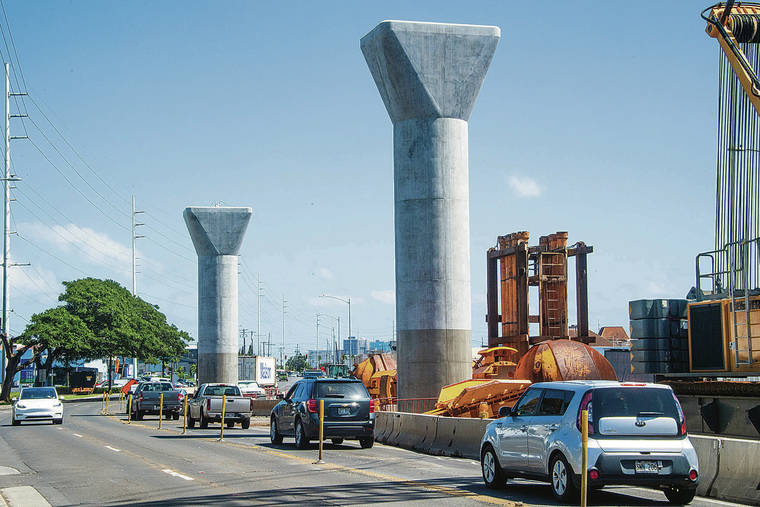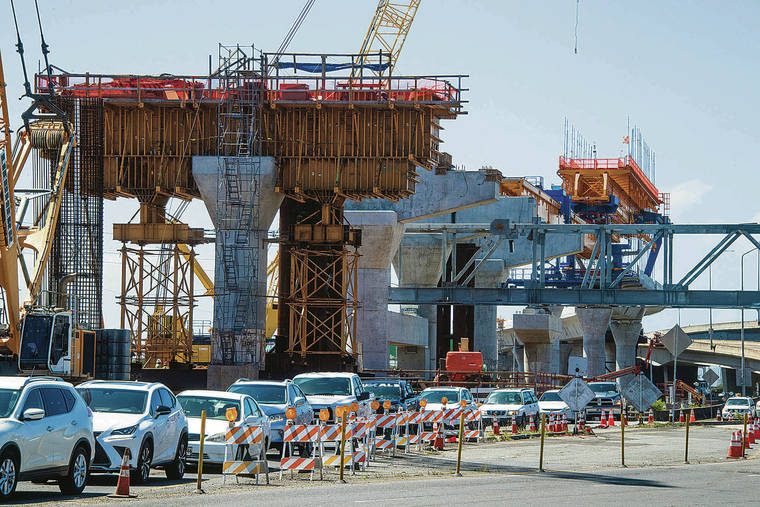The board that oversees the city’s troubled rail project expects to be told today that the cost has now ballooned to $12.449 billion, the projected shortfall stands at $3.577 billion and the completion date has been pushed back to March 2031.
There is no clear or easy plan on how to plug the $3.577 billion deficit as the price tag to build the 20-mile, 21-station project continues to rise.
“The cost has significantly increased just over the last several months,” Kika Bukoski, a member of the Honolulu Authority for Rapid Transportation’s board of directors, told the Honolulu Star-Advertiser. “We’re doing our best to determine the cause and how to control it.”
Bukoski supports Lori Kahikina, HART’s interim CEO and executive director, who has had a rough week a little over two months into her new job.
“I’m very optimistic and hopeful about her,” Bukoski told the Star-Advertiser. “I think she’s doing a pretty good job given the circumstances.”
But after joining HART after working as the city’s director of Environmental Services, Bukoski said, “I think she’s realizing that it’s a whole different animal. But I believe she’s up for the challenge.”
Last week Kahikina apologized to members of the HART board’s Project Oversight Committee for not alerting them that the budget deficit had mushroomed to $3 billion — and had only notified board chairman Tobias Martyn and vice chairman Hoyt Zia.
Then on Tuesday, Kahikina appeared at a sometimes testy and contentious City Council Budget Committee hearing that, at one point, had Kahikina raising her voice, Councilwoman Heidi Tsuneyoshi tearing up and committee Chairman Calvin Say banging his gavel, demanding “proper decorum.”
During the hearing, Kahikina revealed a problem with the rail’s wheels that will affect the interim opening date, potentially pushing it back another year.
The vehicles’ wheels do not fit properly when the tracks cross each other, requiring new crossing points, called frogs.
“They’re very expensive,” Kahikina said. “They’re in the mail, and they need to be manufactured and shipped here. That could delay it one year.”
HART discovered the problem in late 2020, but
Kahikina was notified a few weeks ago.
Kahikina wants the permanent job leading HART.
As interim CEO and executive director, Kahikina earns $22,916.66 per month in salary, or $275,000 annually, and is eligible for up to 20% in bonuses, according to her employment contract.
Her predecessor, Andrew Robbins, was the city’s highest-paid employee. Robbins earned an annual salary of $317,000, a $55,000 annual housing allowance and a $7,200-a- year transportation allowance plus the possibilities of raises and bonuses.
During the full City Council meeting on Wednesday — a day after Kahikina’s contentious discussion with Tsuneyoshi — Tsuneyoshi and Council members Carol Fukunaga and Augie Tulba voted against floating a
$26 million general obligation bond to support HART.
Tulba and Tsuneyoshi both said they could not authorize more funds for rail before actual numbers were presented.
However, Honolulu Managing Director Michael Formby said the $26 million would only cover the costs to keep HART, as an agency, afloat. In the 2018 rail recovery plan, the city was obligated to pay $240 million for construction. In 2020, the City Council passed a measure that would require the city to pay no more than
$26 million a year to fulfill that obligation.
“I’m simply keeping this agency going so that we can ask the tough questions and not do things the way they were done in the past,” Formby said. “To stop paying at this point, can trigger responses from the (Federal Transit Administration) and from the state that we may not be able to stand.”
Tsuneyoshi pushed back, questioning when the federal government would ever release the $744 million it’s withholding for the rail project.
Ultimately, the Council voted 6-3 on Wednesday to authorize the $26 million bond.
The day before, Kahikina told the City Council Budget Committee that HART had been spending $14 million
a month on labor; and
$100 million with only 7% of the construction completed.
Tsuneyoshi — whose district runs from Mililani Mauka, across the North Shore and down the Windward Side to Kahaluu — quickly grew frustrated.
“The federal government is withholding $744 million from us because we haven’t had actualized results in what has happened. Our recovery plan is obsolete,” she told Kahikina. “ … Our only way to get the federal government hopefully back to the table to provide us with the federal funds that are owed to us is by having an updated recovery plan. We don’t have a recovery plan.”
Asked by Tsuneyoshi, Kahikina said that HART still had no internal auditor.
Tensions rose higher when Tsuneyoshi realized that a HART chart shown to the committee included outdated financial information.
“I’ve been beat up in the newspaper, because I’m being too open and honest. And the timing,” Kahikina said. “I’m trying to be fair to my board members. I’m presenting to them on Thursday. I’m presenting to you here on Tuesday. I’m going to get beat up with the board because I’m sharing information to you to the stakeholders, the public. And just as the interviews come up, I’m being open and honest, and I’m getting beat up for it. I didn’t want to put (out) actuals. I have it. But I’m presenting it to the board on Thursday. If I did it to you actually today, you can bet it’s going to be in the paper on Thursday that I shared with you before my board members. So I’m not trying to hide anything Council member.”
That’s when Say intervened with his gavel.
“Please, let’s have some proper decorum,” Say said. “And like I stated earlier on Friday, last week, we should have the respect for those who are testifying.”
Tsuneyoshi acknowledged to Kahikina, “It got very passionate. Sorry. We are both very passionate ladies.”
She concluded by telling Kahikina that, “This has been ridiculous. Next generations of residents are not going to be able to handle what this project has put us through. So with you, I look forward to you and I sitting down and talking.”
Today, some HART board members said they are prepared to discuss the ballooning costs and debt, but have little hope of hearing specific details of a way out.




